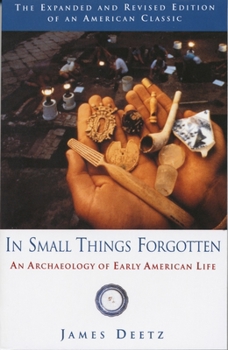In Small Things Forgotten: An Archaeology of Early American Life
Select Format
Select Condition 
Book Overview
A fascinating study of American life and an explanation of how American life is studied through the everyday details of ordinary living, colorfully depicting a world hundreds of years in the past.
History is recorded in many ways. According to author James Deetz, the past can be seen most fully by studying the small things so often forgotten. Objects such as doorways, gravestones, musical instruments, and even shards of pottery fill in the cracks between large historical events and depict the intricacies of daily life. In his completely revised and expanded edition of In Small Things Forgotten, Deetz has added new sections that more fully acknowledge the presence of women and African Americans in Colonial America. New interpretations of archaeological finds detail how minorities influenced and were affected by the development of the Anglo-American tradition in the years following the settlers' arrival in Plymouth, Massachusetts in 1620. Among Deetz's observations: Subtle changes in building long before the Revolutionary War hinted at the growing independence of the American colonies and their desire to be less like the British. Records of estate auctions show that many households in Colonial America contained only one chair--underscoring the patriarchal nature of the early American family. All other members of the household sat on stools or the floor. The excavation of a tiny community of freed slaves in Massachusetts reveals evidence of the transplantation of African culture to North America.
History is recorded in many ways. According to author James Deetz, the past can be seen most fully by studying the small things so often forgotten. Objects such as doorways, gravestones, musical instruments, and even shards of pottery fill in the cracks between large historical events and depict the intricacies of daily life. In his completely revised and expanded edition of In Small Things Forgotten, Deetz has added new sections that more fully acknowledge the presence of women and African Americans in Colonial America. New interpretations of archaeological finds detail how minorities influenced and were affected by the development of the Anglo-American tradition in the years following the settlers' arrival in Plymouth, Massachusetts in 1620. Among Deetz's observations: Subtle changes in building long before the Revolutionary War hinted at the growing independence of the American colonies and their desire to be less like the British. Records of estate auctions show that many households in Colonial America contained only one chair--underscoring the patriarchal nature of the early American family. All other members of the household sat on stools or the floor. The excavation of a tiny community of freed slaves in Massachusetts reveals evidence of the transplantation of African culture to North America.
Format:Paperback
Language:English
ISBN:0385483996
ISBN13:9780385483995
Release Date:August 1996
Publisher:Knopf Doubleday Publishing Group
Length:304 Pages
Weight:0.60 lbs.
Dimensions:0.6" x 5.0" x 8.1"
Customer Reviews
5 ratings
History Made Accessible
Published by Nettie , 5 years ago
We sometimes forget about day to day life in the past. This book is a good way to bring the pas t "home."
Good scholarship, easy reading
Published by Thriftbooks.com User , 15 years ago
One of the earlier entries into the field of material culture and above-ground archeology, this is a winner
Little things mean a lot
Published by Thriftbooks.com User , 17 years ago
I enjoyed Deetz' newly updated introduction to Historical Archaeology in America. He makes clear that much can be gleaned from the seemingly insignificant material things that are left behind in the process of living. I greatly enjoyed his putting the pieces of the puzzles together. Sometimes the result was an interesting surprise. For instance, I didn't know that porches, which became so popular in America, were not a feature of European houses and were introduced by Africans. "Shotgun houses" also have African roots. Another surprising story is told by the changing styles of Colonial gravestones. They change subtly as the religious climate changes. The oldest being very stiff and stern and later ones becoming more decorative, replacing deaths heads with angels.
Remember Small Things
Published by Thriftbooks.com User , 22 years ago
The main thrust of Deetz's argument in this book points to the incomplete nature of the traditional historian's approach to understanding past societies. By focusing only on written documentation, traditional historians necessarily confine the groups they can examine to literate societies, thereby excluding most people in the history of human existence. Furthermore, written documents contain the bias of the author, and so cannot always be trusted. Deetz argues that historical archaeology and the study of material culture opens the door to understanding a far wider band of human societies, and can further help us relate to the literate cultures we study, by providing corroborating evidence, in some cases, and filling in the gaps overlooked in traditional written documents in other cases. This work focuses mainly on early New England societies, but the research methods Deetz puts forth readily adapt to studies in other areas. The fact that this book still stands as required reading on university course lists 25 years after its first publication testifies to its usefulness...
copied directly from Scientific American Nov. 96
Published by Thriftbooks.com User , 27 years ago
History is pretty much junk, one might conclude after finishing this breezy introduction to historical archaeology. Poring over estate listings, pottery shards, gravestones and excavated foundations, James Deetz reconstructs the changing face of American life during the colonial era, as immigrant traditions and aesthetics adapted to the New World. The book makes a powerful argument for an empirical kind of history far removed from the anonymous assertions of high school textbooks






